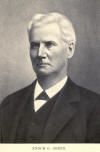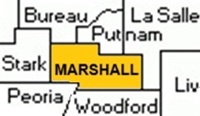
 Enoch
George GREEN, who for many years was connected with agricultural pursuits in
Whitefield township and was one of the prominent and respected residents o
the county, was born in Saratoga county, new York, September 17, 1827. His
parents were Philip and Nancy (ADDINGTON) GREEN, whose family numbered
twelve children. In 1837 they removed with their family to Illinois,
settling in Peoria county, where Enoch George GREEN remained until 1849. He
was educated in the public schools of New York and Illinois, arriving in the
latter state when a youth of ten years. On leaving Peoria county in 1849 he
removed to a farm in Henry township, Marshall county, where he resided for
several years and then took up his residence in the city of Henry, being
engaged in the lumber business at that place for some time. He afterward
removed to a farm in Whitefield township, where he owned two hundred and
forty acres of land, and successfully carried on general agricultural
pursuits, placing his land under a high state of cultivation, so that it
became very productive and profitable.
Enoch
George GREEN, who for many years was connected with agricultural pursuits in
Whitefield township and was one of the prominent and respected residents o
the county, was born in Saratoga county, new York, September 17, 1827. His
parents were Philip and Nancy (ADDINGTON) GREEN, whose family numbered
twelve children. In 1837 they removed with their family to Illinois,
settling in Peoria county, where Enoch George GREEN remained until 1849. He
was educated in the public schools of New York and Illinois, arriving in the
latter state when a youth of ten years. On leaving Peoria county in 1849 he
removed to a farm in Henry township, Marshall county, where he resided for
several years and then took up his residence in the city of Henry, being
engaged in the lumber business at that place for some time. He afterward
removed to a farm in Whitefield township, where he owned two hundred and
forty acres of land, and successfully carried on general agricultural
pursuits, placing his land under a high state of cultivation, so that it
became very productive and profitable.
On the 20th of November, 1849,
was celebrated the marriage of Mr. GREEN and Miss Harriet M. COYKENDALL, who
was born at Bakers Bridge in Allegany county, New York, November 20, 1832.
She is a daughter of J. B. COYKENDALL, who was born in New Jersey and was a
blacksmith by trade. He came to Illinois in 1836 and settled six miles north
of Canton, where he owned a large farm and in connection with its
cultivation conducted a blacksmith shop upon his place. Later, however, he
concentrated his energies upon his agricultural interests. His political
allegiance was given to the democracy, of which he was a stanch advocate. He
married Miss Rhoda ROBERTS, a native of Rhode Island. The COYKENDALL family
arrived here a year before the removal of the GREENs from New York and
settled on a farm about two miles from the GREEN home.
Unto Mr. and
Mrs. COYKENDALL were born nine children, five sons and four daughters, of
whom one daughter died in infancy. Five of the eight children who reached
maturity became school teachers and two were quite prominent. Elizabeth died
at the age of thirty-eight years. Mrs. Mary Catherine GRAYSON, who engaged
in teaching for twenty-five years, lives at Russell, Iowa. She and her
husband own a large farm and also good town property and are now living
retired. D. B. and A. J. COYKENDALL followed the blacksmith’s trade and died
near Canton, Illinois. Jonathan COYKENDALL learned harness making and
saddlery in his youth and went to St. Louis and New York to perfect his
trade. In 1849, during the gold excitement on the Pacific slope, he paid one
hundred dollars to join a company and drove an ox team across the plains and
at length arrived at Hangtown. For some time he engaged in mining in the
vicinity of Diamond Springs and from there to Alamath and Salmon river,
where he met with an accident, his leg being broken twice by the caving in
of dirt. As there was no physician in the locality he and his partner had to
set it, but as he said that not being in their line of business they did not
do a very good job. Returning east he established a store at Farmington,
Illinois, where he dealt in clothing, boots and shoes and took out a patent
for a dirt excluder shoe, which proved a success. He could not, however,
forget sunny California and finally returned to that state, locating in San
Jose, where he purchased a market and engaged in the wholesale meat
business, dealing in hams, bacon and lard. At first he had to go to Chicago
for his meats. Later he erected a magnificent brick market, which was mostly
destroyed by the recent earthquake. Besides his city property he owned a
fine fruit ranch and was always proud of the fact that he a “forty-niner.”
Being thrown form his carriage he had the same leg broken again and never
recovered from the injury, dying ten weeks later. His funeral was under the
auspices of the Pioneer Society and the Masons and his body was cremated and
interred in Cypress Lawn cemetery, San Francisco. John R. and Horatio G.
COYKENDALL were born and reared on the home farm in this state and attended
the neighboring schools. When the Civil war broke out they enlisted in the
First Illinois Cavalry and were captured by the Confederates. John R. was
made captain of Company G in the regiment commanded by Colonel Robert
INGERSOLL and remained in the service until the close of the war. He now
lives in Piedmont, Oklahoma. Horatio G. also won a captaincy for meritorious
service in many a hard fought battle. After the war he engaged in railroad
building on an extensive scale, building more miles of railroad than any man
living at that time. His home life was exemplary. He possessed a kind and
sympathetic nature and was a consistent Christian and worthy citizen. He was
a man of iron will and great energy – a typical man of the northwest, his
home being at Merriam Park, St. Paul, Minnesota. He died from the effects of
an operation for gallstones at Rochester, that state. Socially he was a
member of Minnesota Commandery of the Military Order of the Loyal Legion of
the United States.
Mr. and Mrs. GREEN became the parents of eight
children, but only two are now living, namely: Charles A., who lives with
his mother in Whitefield township; and Minnie Hortense, the wife of C. C.
SMITH, of Henry. Those deceased are Lizzie, who died at the age of ten
years; and Lula, Lillie, Dolly, Phoebe and Ernest, who all died in infancy.
After a useful and well spent life Mr. GREEN passed away on the 3d of June,
1895, when he was sixty-eight years of age. He held a number of different
offices and was very prominent and influential in local affairs. His service
as justice of the peace won him the title of squire, by which he was
sometimes known. He gave his political allegiance to the republican party
and bore a conspicuous and helpful part in matters relating to the general
welfare. He ever bore a high reputation for ability, loyalty and integrity
and wherever known he commanded the respect and confidence of his fellow
citizens and of all with whom he had business or social relations. Coming to
Illinois at an early period in its development, he was an interested witness
of its growth and progress for many years and was entirely familiar with
pioneer experiences and the history of this portion of the state at an early
day.
Extracted 10 May 2011 by Norma Hass from Past and Present of
Marshall and Putnam Counties Illinois, 1907.
| Bureau Putnam La Salle | |||
| Stark |
 |
||
| Peoria | Woodford | ||

